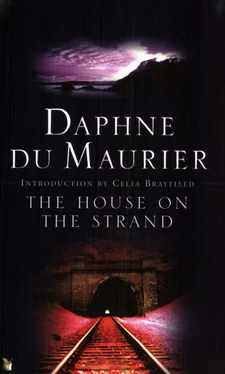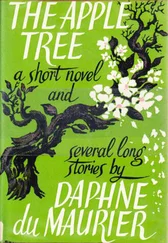I drove slowly up the drive, turned left out of the lane to the main road, and went down Polmear hill, pausing when I reached the bottom to survey the scene. Here, where the almshouses and the inn stood now, had been yesterday's ford. The lie of the land had not altered, despite the modern road, but the valley where the tide had swept inward was now marsh. I took the lane to Tywardreath, thinking, with some misgiving, that if I had in fact taken this same route yesterday, under the influence of the drug, I could have been knocked down by a passing car without hearing it.
I drove down the steep, narrow lane to the village and parked the car a little above the church. There was still a light rain falling, and nobody was about. A van drove up the main Par road and disappeared. A woman came out of the grocer's shop and walked uphill in the same direction. No one else appeared. I got out of the car, opened the iron gates into the churchyard, and stood in the church porch to shelter from the rain. The churchyard itself sloped away in a southerly direction until it terminated at the boundary wall, and beneath it were farm-buildings. Yesterday, in that other world, there were no buildings, only the blue waters of a creek filling the valley with the incoming tide, and the Priory buildings had covered the space the churchyard held today.
I knew the lie of the land better now. If the drug took effect I could leave the car where it was and walk home. There was no one around. Then, like a diver taking a plunge into some arctic pool, I took the flask and swallowed the contents. The instant I had done so panic seized me. This second dose might have a quite different effect. Make me sleep for hours. Should I stay where I was, or should I be better off in the car? The church porch gave me claustrophobia, so I went out and sat down on one of the tombstones, not far from the pathway but out of sight of the road. If I stayed quite still, without moving, perhaps nothing would happen. I began to pray, Don't let anything happen. Don't let the drug have any effect.
I went on sitting for about five minutes, too apprehensive about the possible effects of the drug to mind the rain. Then I heard the church clock strike three, and glanced down at my watch to check the time. It was a few minutes slow, so I altered it, and almost immediately I heard shouting from the village, or cheering, perhaps — a curious melange of the two — and a creaking sound like wheels. Oh God, what now, I thought, a travelling circus about to descend the village street? I shall have to move the car. I got up and started to walk along the path to the churchyard gate. I never arrived, because the gate had gone, and I was looking through a rounded window set in a stone wall, the window facing a cobbled quadrangle bounded by shingle paths.
The entrance gate at the far end of the quadrangle was open wide, and beyond it I could see a mass of people assembled on the green, men, women, children. The shouting was coming from them, and the creaking sounds were the wheels of an enormous covered wagon drawn by five horses, the second leader and the horse between the shafts carrying riders upon their backs. The wooden canopy surmounting the wagon was painted a rich purple and gold, and as I watched the heavy curtains concealing the front of the vehicle were drawn aside, the shouting and the applause from the crowd increased, and the figure which appeared in the aperture raised his hands in blessing. He was magnificently dressed in ecclesiastical robes, and I remembered that Roger and the Prior had spoken of an imminent visit by the Bishop of Exeter, and how apprehensive the Prior had been — doubtless with reason. This must be His Grace in person.
There was a sudden hush, and everyone went down upon their knees. The light was dazzling, the feeling had gone from my limbs, and nothing seemed to matter any more. I did not care — the drug could work on me as it wished; my only desire was to be part of the world about me.
I watched the bishop descend from his covered vehicle, and the crowd pressed forward. Then he entered the gate into the quadrangle, followed by his train. From some door beneath me I saw the Prior advance to meet him at the head of his flock of monks, and the entrance gates were closed against the crowd.
I looked over my shoulder and saw that I was standing in a vaulted chamber filled with a score or more of people, waiting to be presented, to judge by their hushed sense of expectancy. From their clothes they belonged to the gentry, and so presumably were permitted entrance to the Priory.
"Mark it well," said the voice in my ear, "she'll not wear paint on her face on this occasion."
My horseman, Roger, stood beside me, but his remarks were addressed to a companion, a man of about his own age or somewhat older, who put his hand before his mouth to stifle laughter.
"Painted or plain, Sir John will have her," he answered, "and what better moment than the eve of Martinmas, with his own lady safely brought to bed eight miles away at Bockenod?"
"It could be contrived," agreed the other, "but with some risk, for she cannot depend upon Sir Henry's absence. He will scarcely sleep at the Priory tonight, with the Bishop in the guest chamber. No, let them wait awhile longer, if only to whet appetite."
Scandal had not changed much through the centuries, then, and I wondered why this back-chat should intrigue me now, which, if it had been exchanged by my contemporaries at some social event, would have made me yawn. Perhaps, because I was eavesdropping in time and within monastic walls, the gossip held more spice. I followed the direction of their gaze to the small group near to the door, the favoured few, no doubt, to be presented. Which was the gallant Sir John — the same who liked a foot in both camps, if I remembered the Prior's comment rightly — and which the favoured lady of his choice, shorn of her paint? There were four men, three women and two youths, and the fashion of the women's headgear made it difficult to distinguish their features from a distance, swathed as they were in coif and wimple. I recognised the lord of the manor, Henry de Champernoune, the dignified, elderly man who had been at his prayers in the chapel yesterday. He was dressed more soberly than his friends, who wore tunics of varying colours hanging to mid-calf; with belts slung low beneath the hip, and pouch and dagger in the centre. All of them were bearded and had their hair curled to a fizz, which must have been the prevailing fashion. Roger and his companion had been joined by a newcomer in clerical dress, a rosary hanging from his belt. His red nose and slurred speech suggested a recent visit to the Prior's buttery.
"What is the order of precedence?" he mumbled. "As parish priest and chaplain to Sir Henry surely I should form part of his entourage?"
Roger laid a hand on his shoulder and swung him round to face the window. "Sir Henry can do without your breath, and his Grace the Bishop likewise, unless you wish to forfeit your position."
The newcomer protested, clinging nevertheless to the protection of the wall, then lowered himself on to the bench beside it. Roger shrugged his shoulder, turning to the companion at his side.
"It surprises me that Otto Bodrugan dares show his face," said his friend. "Not two years since he fought for Lancaster against the King. They say he was in London when the mob dragged Bishop Stapledon through the streets."
"He was not," replied Roger. "He was with many hundreds of the Queen's party up at Wallingford."
"Nevertheless, his position is delicate," said the other. "If I were the Bishop I should not look kindly upon the man reputed to have condoned the murder of my predecessor."
"His Grace has not the time to play politics," retorted Roger. "He will have his hands full with the diocese. Past causes are no concern of his. Bodrugan is here today by reason of the demesnes he shares with Champernoune, because his sister Joanna is Sir Henry's lady. Also, out of his obligation to Sir John. The two hundred marks he borrowed are still unpaid."
Читать дальше












